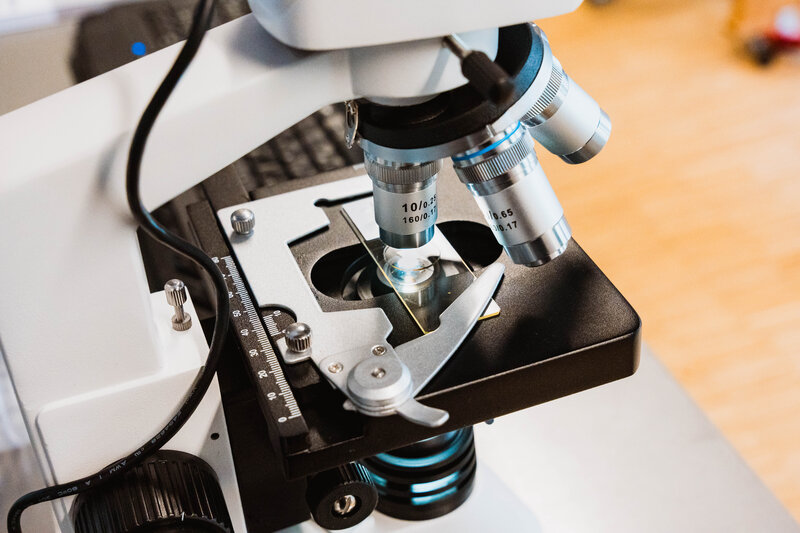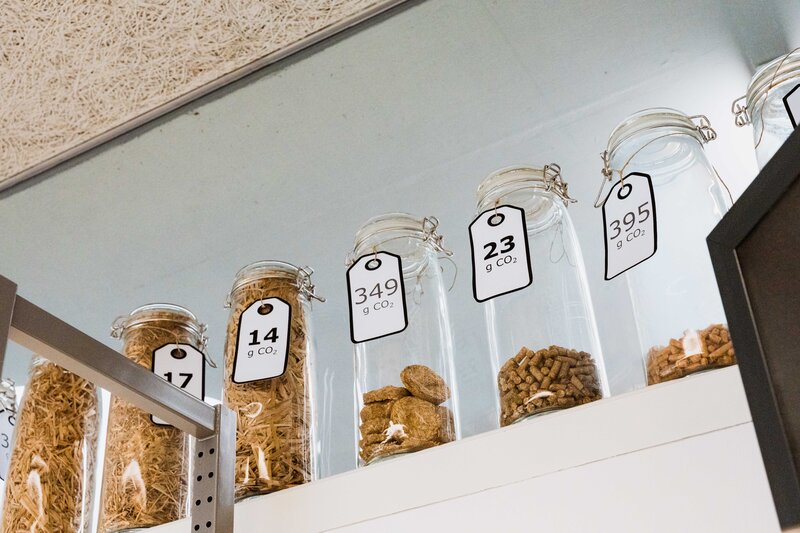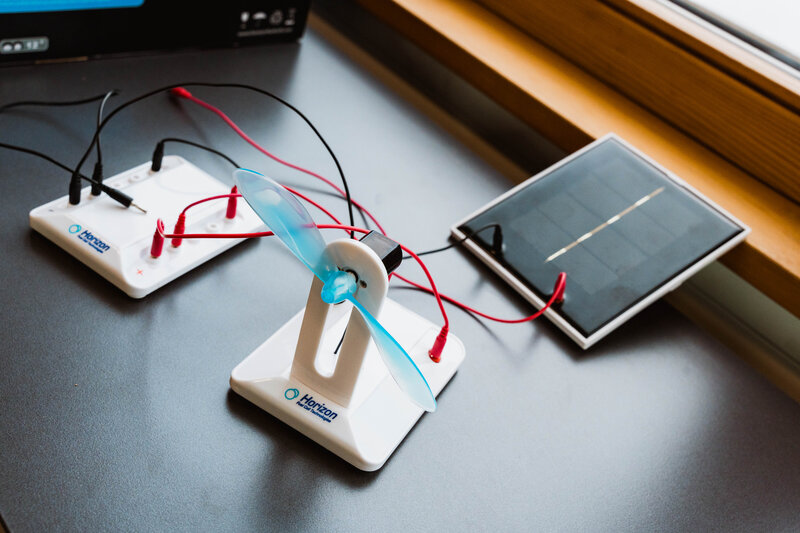Our practical bachelor’s degree program equips you with the ideal education for careers in energy consulting, sustainability consulting, and project management. Become a shaper of a sustainable future!

Energy & Sustainability Management
Bachelor's degree program
Overview
-
Qualification Level:
Stufe 1, Bachelor -
Price:
Euro 363,36* (excl. Student Union-fees) each semester -
Academic Degree:
Bachelor of Arts in Business (BA) -
Academic Program:
Full-time -
Language:
77% German, 23% English -
Remote Options:
E-Learning max. 30 % online -
Exchange Semester:
Organized semester abroad, 3rd semester** -
Admission Requirements:
General admission requirements -
Study Places per Year:
20
Program Description
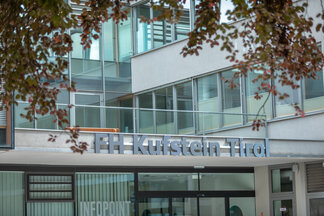


Unlock the path to a sustainable future with our full-time bachelor's degree program in Energy & Sustainability Management. Transform energy supply and reshape business practices. Be part of the solution for environmental and climate protection.
Immerse yourself in a comprehensive education in Energy & Sustainability Management with our degree program. From mastering theoretical foundations to developing sustainable business models, you'll learn to create responsible solutions. With a focus on digital integration and the social and economic dimensions of sustainability, you’ll be equipped to lead innovative 21st-century projects. Become a driving force for sustainable change in businesses and communities. With diverse career opportunities in energy consulting, sustainability management, and renewable energy, you’ll help shape a greener, more equitable world.
Study Focus
-
60 %
Technological knowledge in sustainability and energy systems
-
20 %
Expertise in business & management
-
20 %
Social skills & communication
What You Will Learn
-
Develop and implement sustainability goals.
-
Evaluate sustainability aspects of products and services
-
Independently carry out energy and environmental and sustainability consulting
-
Projects in the energy and sustainability sector
-
Developing and managing the distribution of sustainable, energy-efficient and environmentally friendly products and services
-
Developing solutions for the implementation of innovative mobility concepts
-
Trading in renewable energies
Popular Occupational Fields
- Energy & sustainability consulting
- Municipal sustainability management
- Project management energy systems
- Energy trading
- Sales management for energy & sustainability
Career Opportunities
-
EUR 42,400 average salary
for sustainability managers in Germany 2024 (according to Kununu)
-
EUR 40,200 average salary
füSustainability managers in Austria 2024 (according to Kununu)
The path to the Bachelor's Degree
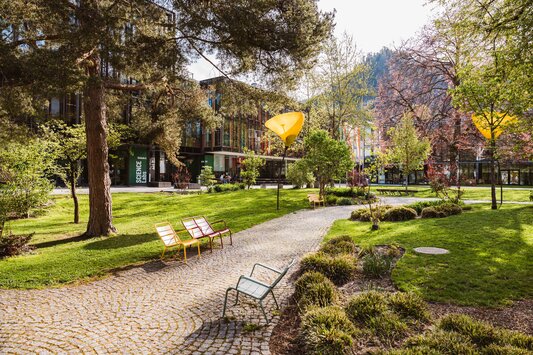
In the first two semesters, students gain foundational knowledge in sustainability management and renewable technologies, with a focus on business, investment, and social skills. In the third semester, students have the option to study abroad. In the later semesters, they deepen their expertise, engage in practical projects, and complete an internship. The program culminates in a bachelor’s thesis in the field of Energy & Sustainability Management.
Special features:
-
Intensive project weeks for professional competence and practical relevance
-
Regular fireside chats for corporate contacts
-
Personal supervision by teachers and the program team
Recognition of Prior Learning
Students with sufficient qualifications from Austrian commercial academies and higher vocational schools with an economic focus (in both Germany and Austria) may receive credit for courses from the 1st and 2nd semesters.
To apply for credit, they must submit a request directly to the Director of Studies.
Director of Studies

Asc. Prof. (FH) Dipl.-Ing. Christian Huber
Director of Studies Bachelor Energy & Sustainability Management, Facility & Real Estate Management / Master Energy & Sustainability Management, Facility & Real Estate Management / Institute for Sustain & Estate
Curriculum
international competence
Foreign Language I
- Semester 1
- 6 ECTS
The language modules integrated into the degree program curriculum are designed according to the methodological principles of a communicative, action-oriented approach. The competence levels of the modules are based on the Common European Framework of Reference for Languages (CEFR), and a central objective is that students increase their communication skills by at least one level. In addition, there is a clear focus on acquiring academic and business-oriented skills in the target language. • A1-A2 Basic communication skills • B1-B2 Advanced use of the language and communication skills • B2-C1 Independent language use to expert communication skills • C1-C2 Expert language skills to fluent, competent communication skills
DetailsForeign language II
- Semester 2
- 6 ECTS
The language modules integrated into the degree program curriculum are designed according to the methodological principles of a communicative, action-oriented approach. The competence levels of the modules are based on the Common European Framework of Reference for Languages (CEFR), and a central objective is that students increase their communication skills by at least one level. In addition, there is a clear focus on acquiring academic and business-oriented skills in the target language. • A1-A2 Basic communication skills • B1-B2 Advanced use of the language and communication skills • B2-C1 Independent language use to expert communication skills • C1-C2 Expert language skills to fluent, competent communication skills
DetailsSelected Topics on Scientific and Empirical Methods
- Semester 3
- 5 ECTS
Due to the large number of partner universities and the choice of scientific and empirical methods they offer, a generally valid description of the course content for the semester abroad cannot and should not be defined in order to guarantee students freedom of choice. The content of the courses is oriented towards the fundamentals and in-depth knowledge of the individual disciplines in the field of scientific and empirical methods. As an example, this module has the following course contents: • Qualitative and quantitative scientific methods: o Questionnaire o Interview o Qualitative and quantitative content analysis o Field and laboratory study (focus experiment, A/B test and simulation) • Tools and examples: o Data collection o Data analysis o Visualization of results • Description and critical reflection of results
DetailsSelected Topics Social skills and Presentation
- Semester 3
- 7 ECTS
A generally valid description of the course content for the semester abroad cannot and should not be defined due to the large number of partner universities and the choices they offer, in order to guarantee freedom for students. The learning contents are based on the fundamentals and in-depth knowledge of the individual disciplines in the area of social skills. As an example, this module has the following course contents: • Basic components of communicative processes, message and meaning as well as content and relationship aspects of human communication • Language, gestures, facial expressions, posture • Possibilities of communication for assessment and motivation • Communication in a team • Communication problems and conflict solutions • Goals and target group as well as structure, content and form of a presentation • Selection and application of different presentation techniques and media • Challenges of dislocated presentations • Goals and target group as well as content and form of 3D visualizations • Selection and application of tools for the creation of 3D visualizations • Objectives and target group as well as structure, content and form of short videos • Selection and application of simple techniques and tools for video creation
DetailsSelected Topics Economics
- Semester 3
- 10 ECTS
A generally valid description of the course content for the semester abroad cannot and should not be defined due to the large number of partner universities and the choices they offer, in order to guarantee freedom for students. The learning contents are based on the fundamentals and in-depth knowledge of the individual disciplines in the field of economics. As an example, this module has the following course contents: Core Topics: • Economic thinking and marginal analysis • Efficient allocation of scarce resources • Market model and market equilibrium • Macroeconomic variables (GDP, inflation and unemployment) and the interrelationships Selected economics topics: • Elasticity and welfare • Cost functions and optimal firm production • Price setting and market forms • Short-term economic fluctuations: Business cycle • Money, the ECB and inflation • Long-term economic growth • International relations and trade
DetailsSelected Topics Business Administration
- Semester 3
- 8 ECTS
A generally valid description of the course content for the semester abroad cannot and should not be defined due to the large number of partner universities and the choices they offer, in order to guarantee freedom for students. The learning contents are based on the fundamentals and in-depth knowledge of the individual disciplines in the field of business administration. As an example, this module has the following course contents: • Fundamentals of a company with a focus on digital business models • Components of a business plan and creation of a personal business plan • Business model analysis • Fundamentals of marketing business models
DetailsInternational Energy & Sustainability Development - Project (E)
- Semester 5
- 6 ECTS
The module consists of a compact week (100%), during which the following course contents are worked on in small groups with international students: • Introduction, consolidation, background and examples in the complex of topics of the project within the framework of a conference or introductory event. • Research and analysis of framework conditions and possibilities • Development and visualization of ideas and concepts • Presentation of the results to stakeholders and/or technical experts
DetailsPractice transfer & empiricism
Scientific and Empirical Methods
- Semester 1
- 6 ECTS
• Principles of academic and scientific work o Science and scientific language o Literature research o Citation and source work o Avoidance of plagiarism • Principles of descriptive and explorative statistics o statistical characteristics and variables o univariate and multivariate descriptive and explorative statistics o index numbers o correlation and regression analyses o concentration measurement o time series analysis
DetailsProject Management & Practical Project I
- Semester 4
- 6 ECTS
The students have to carry out a project independently in small groups to the extent of 4 ECTS = 100h. The basis for this is a given objective. Planning, coordination, budgeting, control, communication and reporting as well as finding solutions are in the hands of the students. The role of the course director focuses on coaching the students. In addition to the project, basic principles of project management and application of supporting tools are part of this module: • Project planning (project organization, resource planning with time planning, as well as cost, financial and budget planning). • Project management (time management, cost control and accounting, team leadership, quality management for projects)
DetailsPractice Transfer & Practical Project II
- Semester 5
- 5 ECTS
The students have to carry out a project independently in small groups to the extent of 4 ECTS = 100h. The basis for this is a given objective. Planning, coordination, budgeting, control, communication and reporting as well as finding solutions are in the hands of the students. The role of the course director focuses on coaching the students. In addition to the project, the following teaching and learning content is part of this module: • Examples and approaches to solutions from practice and research are presented in lectures by experts in the field and, where appropriate, excursions to companies and research institutions.
DetailsBachelor Thesis Seminar
- Semester 6
- 10 ECTS
The module includes the preparation of a Bachelor thesis of 8 ECTS. Within the framework of the Bachelor thesis, regular meetings are held to discuss the current status and progress of the Bachelor thesis with the accompanying academic supervision. The following content is also taught: • Advancing the knowledge of scientific methods in relation to the independent Bachelor thesis • Visualization of scientific results such as posters, video, infographics In addition to the Bachelor thesis, the final board examination (final Bachelor examination)up to 2 ECTS forms part of this module. Students receive information on the final Bachelor examination and are supported in preparing for the examination.
DetailsInternship & Business Personality Development
- Semester 6
- 20 ECTS
Students have to complete an internship of 19 ECTS = 475h. This time can be credited for students who are working in a specific field. The following contents are taught during the internship: - Complementing and deepening the knowledge acquired in the course of study through practical activities and business law issues at a company. The professional internship ensures that the students find their way when entering professional life after graduation and gain confidence in the implementation of their acquired knowledge through experience already gained. In addition to the internship, the following learning contents are part of this module: • Reflection on own strengths and weaknesses • Possibilities of self-marketing • Implementation strategies for a personal work-life balance
DetailsTechnology
Fundamentals of Energy Technology
- Semester 1
- 6 ECTS
Electrochemistry: • Elementary types of chemical bonding • Stoichiometry of reaction products and reaction products • Combustion calculation • Electrochemistry Mechanics: • Mechanical principles of force balance and energy conservation Thermodynamics: • Thermodynamics of ideal and real gases (equations of state, theorems) • Cyclic processes of thermodynamics with emphasis on the water-steam cycle • Mechanisms of heat transfer and their technical use • Basic concepts of hydrostatics and hydrodynamics
DetailsPrinciples of Electrical Engineering
- Semester 1
- 6 ECTS
• Kirchhoff's laws • Basic quantities of alternating current and three-phase current • Reactive, active and apparent power • Applications of semiconductors in metrology, digital technology and power electronics • Description of electrical machines, motors and generators by pointer diagrams • Asynchronous and synchronous machines • Properties and structures of control loops • Definition of current and voltage • Electric and magnetic field • Theory of electrical conduction in doped electrical semiconductors • Photoelectric effect • Practical experimental setups in the laboratory
DetailsRegenerative energy production
- Semester 2
- 10 ECTS
• Global and national energy demand / energy mix • Energy conversion chain and energy balance • Historical development of primary and secondary energy sources and their extraction, storage and use • Definition and interpretation of basic terms used to describe renewable energy sources • Methods for determining the resource situation and problems of volatile renewable energy resources • legal aspects of the use of renewable resources including laws and regulations of waste and wastewater management • Processes of waste treatment and recycling as well as construction of a wastewater treatment plant with mechanical, biological and chemical-physical purification steps • Structure, mode of operation and characteristic values of energy generation plants: o thermal solar plants o heat pumps o energetic biomass utilization o energetic utilization of waste and utilization of biogas, landfill gas and hydrogen o photovoltaics o hydroelectric power plants o wind power plants o deep geothermal energy and geothermal power generation o solar thermal power generation o selected innovative renewable energy generation options currently under research • Structure, mode of operation and storage duration of energy storage and energy conversion systems o chemical (inorganic and organic) o thermal o mechanical (kinetic and potential) o electrical • Aspects of sustainability in terms of efficiency, environmental impact, and CO2 reduction of energy production facilities. Field trips to selected renewable energy generation facilities will take place as part of this module.
DetailsDigitization in Energy & Sustainability Management (E)
- Semester 2
- 4 ECTS
• Basic programming knowledge for data preparation • Analysis and presentation of information from data sets
DetailsSmart energy systems
- Semester 4
- 9 ECTS
Smart Grids - electricity networks: • Technical, economic and legal aspects of transmission and distribution of electrical energy (overhead line, cable) • Tasks of network operators and the function of network regulation (incentive regula-tion) • Basic principles of network planning, network maintenance and network operation • Effects of feed-in and consumption on network operation in the transmission and distribution network • Network access and network use • Current trends in electrical supply networks heating/cooling networks: • Technical, economic and legal aspects of the transmission and distribution of heat and cold (district and local heating/cooling networks, MicroGrids) • Basic principles of network planning, maintenance and operation including merit order • Current trends in heating and cooling networks Logistics of energy sources: • Technical, economic and legal aspects of logistics of primary and secondary energy sources • Basic principles of logistics planning • Tasks of logistics companies and energy suppliers • Current trends in logistics of energy sources
DetailsInnovative Mobility Concepts
- Semester 4
- 6 ECTS
• Mobility behavior and user groups • Mobility-relevant emission types (greenhouse gases, air pollutants and noise) • Land requirements for mobility • Alternative drive technologies • Storage and filling station network • Opportunities and risks of automated and autonomous driving • Mobility as a service • Strategies for mobility avoidance • Public transport concepts for urban and rural areas • Legal and technical requirements for the use of regeneratively generated electricity in the mobility sector in companies and in residential buildings • Economic efficiency of mobility concepts • Current trends in interdisciplinary mobility research
DetailsRegional Energy Concepts
- Semester 5
- 5 ECTS
Regional Energy Master Plan: • legal basics • participation of stakeholders and process of a regional energy master plan • methods for stock and potential analysis (consumption, infrastructure, resources) • methods for concept development and preparation of a catalogue of measures • organizational structures for implementation • analysis of implementation examples
DetailsBusiness and Management
Fundamentals of Energy & Sustainability Management
- Semester 1
- 6 ECTS
• Historical development and future challenges of the energy industry, environmental protection and sustainability • Stakeholders of the energy industry, environmental protection and sustainability • Ecological, economic and social aspects of sustainability • Basic concepts of the energy industry •- UN Sustainability Goals as well as exemplary national, regional sustainability goals and sustainability objectives of companies • Basics of quality management according to ISO 9001 • Structure and organization of a quality management system • Definition of quality in relation to Energy & Sustainability Management • Guidelines of European energy and environmental policy • Guidelines and fundamentals of energy and environmental law • Promotion of renewable energies and sustainable developments
DetailsInvestment & Finance for Energy & Sustainability Management (E)
- Semester 2
- 4 ECTS
• Investment decision as a process in the entrepreneurial environment • Static and dynamic procedures of investment calculation • Profitability ratios of the profitability calculation • Case studies of investments in the generation and distribution grid sector as well as in sales and customer projects • Energy and environmental protection services from the supplier and customer point of view • Contract design of different service models
DetailsFundamentals of Business Administration & Economics (E)
- Semester 2
- 6 ECTS
• Overview and context analysis of the most important subareas in business admin-istration • Subject and fundamentals of business administration: o Operational functional areas o Business-related decision theory o Fundamentals of management and ethics o Fundamentals of Human Resources and organization o Marketing fundamentals • Fundamentals of business-related management: o Constitutive company decisions such as legal forms, location decisions, types of mergers and acquisitions and choice of business segment o Functional company decisions: Materials management, production management, marketing • Fundamentals of business value creation processes and functions (value creation architecture and structure) • Fundamentals of market-, process- and strategy-oriented management • Microeconomics and the behavior of managers and companies • Price and product policy of companies • Elementary principles of game theory • Company organization • Market forms and market entry • Decisions under uncertainty • Behavioral economics • Economy of digitization • External accounting: o Structure of the accounting system o Fundamentals of operational accounting: Tasks, sub-areas and basic concepts o Commercial accounting system: From inventory to opening balance sheet o Double-entry accounting system: Posting business cases to inventory and profit and loss accounts o Organization of bookkeeping (chart of accounts, sales tax, etc.) o Principle of period purity and accruals and deferrals • Internal accounting: o Objectives and basic concepts of cost and revenue accounting o Fundamentals of cost and revenue accounting: Tasks, components and subareas o Structure of cost accounting (cost elements, cost centers, cost objects) o Contribution margin accounting
DetailsSustainability Assessment
- Semester 4
- 5 ECTS
• Calculation methods and indicators for life cycle analysis • Corporate Social and Sustainable Responsibility (CSR) reporting
DetailsEnergy Markets
- Semester 4
- 4 ECTS
• Unbundling of natural monopolies and free energy markets • European and national development of the electricity and gas industry • Energy pricing and influencing factors • Standardized exchange products and trading markets • Comparison of different approaches for energy services, balancing energy services and capacity services • Merit - Order • Trading cascade • Markets for renewable energy sources • Certificate trading • Clean Dark Spread, Clean Spark Spread
DetailsInnovation Management (E)
- Semester 5
- 5 ECTS
• Phase model to describe the spread of technical innovations • Design Thinking • Open Innovation • Innovation management and interlocking with the technology and market management of companies • Success factors for innovation management projects • Current examples of innovations
DetailsEnergy & Sustainability Audit
- Semester 5
- 9 ECTS
• Audits for static and dynamic quality management • Auditing of management systems (ISO 19011) • Energy & Sustainability Auditing process and monitoring (ISO 14001) • Occupational health and safety (ISO 45001) • Aspects of building physics and building and materials science as well as classification of the energy efficiency of building envelopes • Energy efficiency of technical building systems (heating, ventilation, air conditioning) as well as lighting and electricity consumption for appliances • Collection and analysis of energy data and measured values • Systematics of the energy performance certificate • Energy management (ISO 50001) • Introduction to process modelling • Tasks of an Energy & Sustainability Auditor • Analysis of examples of Energy & Sustainability Auditing
DetailsStudy regulations to download
-
Energy & Sustainability Management
in effect since May 03, 2023, start of study program from academic year 2023/24
- All study regulations
Frequently Asked Questions
Do I need prior technical or in-depth knowledge of mathematics and science?
No, the degree program covers all relevant technological systems. No special prior knowledge is required. The focus is on communication and organizational skills as well as business management thinking. This degree program is particularly suitable for graduates from business and communication-oriented schools who would like to become involved in the field of sustainability, environmental and climate protection.
What is the job market like in the field of energy and sustainability management?
The market shows a very high demand and a great shortage of skilled workers. Increasing environmental and climate requirements as well as the ever-increasing market relevance of sustainable products and services offer very good and long-term career opportunities.
What is special about this degree program?
Compared to other degree programs, it offers a broad range of skills in sustainability communication, business and technology. A high level of practical relevance and contact with corporate networks from the first semester onwards offer excellent job opportunities in a future-proof field of activity.
Is the degree program practice-oriented?
Yes, excursions, projects and fireside chats create a practical learning environment. Students make contact with start-ups and companies in order to build and maintain their networks.
Can I work while studying?
Classroom teaching usually occurs from Monday to Friday, occasionally on Saturdays in blocked units. With a significant amount of self-study, students can manage their schedules independently and have the flexibility to work part-time in the industry.
Where can I spend the semester abroad?
We have over 225 partner universities worldwide from which our students can choose. Some partner universities are particularly suitable for students from this degree program, as they offer further content and thus allow students to deepen their skills even further.








